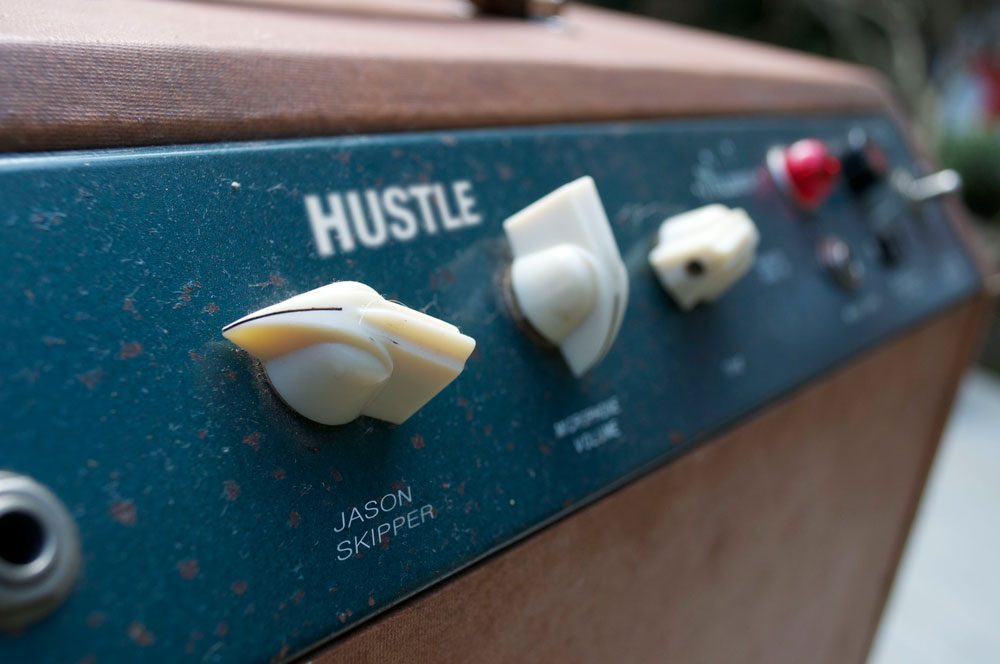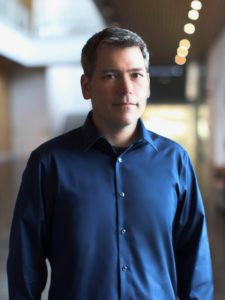Jason Skipper is the author of Hustle, a finalist for the PEN Center USA Award for Fiction. He studied in the MFA in Creative Writing program at Miami University and in the Ph.D. in Creative Writing program at Western Michigan University, where he was a fiction editor of Third Coast. His fiction and nonfiction have appeared in numerous publications, and he has received awards and recognition from Zoetrope: All-Story, Glimmer Train, the Sewanee Writers’ Conference, and Artist Trust of Washington. He teaches in the Rainier Writing Workshop, the low-residency MFA in creative writing.
Contact: jason@jasonskipper.com
(Samples from and links to) Interviews:
Mind Adrift in the West
You’ve done a lot of traveling in support of Hustle. What’s been your worst road experience? Your best?
This year I was away from home almost constantly between September 2nd and December 1st, visiting bookstores and universities, and doing house readings. Self-funded and self-organized, with advice I got from friends and my publicists. Writers talk about the crazy loneliness of touring alone, but no one can prepare you for the ways it manifests throughout many of the days: waking up in a different place, often under threadbare blankets in an old motel room that reeks of decades of carpet cleaner, so you know it’s hiding some awful history (one room was so bad I slept fully clothed, wearing a hoodie); putting another $35.00 in the gas tank each morning (then getting lost several times while en route); passing all the dead raccoons on the roadside (gross but completely true!); eating salt-soaked fast food and growing rounder while learning the temperament of drivers in each new state (if you don’t go ninety in parts of Michigan, you get run over); the severity of introspection that comes with being alone in a car for hours (salvation comes from singing loudly to anthemic punk rock); that mild relief/panic before opening the door on another motel room (you know if the a/c is on full blast, it’s thinning out some smell); and hoping the reading would go smoothly (which it almost always does). At the same time all of this is quite beautiful, and it was great to stay with friends and family when I could. I knew it would be challenging, but, like most things I end up doing, I wanted the experience.
The events themselves are the best part. So no two readings are ever the same, I do something different each time: I’ve sung Dwight Yoakam as I read, and I’ve sung Wilco songs during Q&A’s as part of an answer. I’ve had audience members read with me. I’ve truly – above all else – enjoyed meeting the many people that I have met along the way. Bookstores owners and booksellers who are excited about Hustle. Other writers and teachers. Book clubs are great. People who have read the book and are nervous to talk about it. People who say they finished the book in a single plane ride or they couldn’t go to sleep because they couldn’t put it down, which really surprised me. People who want to tell me which actors should play which parts in the movie version, if there is a movie version. Someone said Gary Busey for the grandfather, and I thought that was a riot. Also I’ve been able to hand off books to Rhett Miller, the singer for the Old 97’s who appears in the novel at a crucial time in Chris’s life, and to Dorothy Allison, who is a hero of mine. Many times, over the nine years it took to write and publish the book, I thought it would never come out, and I still freak out when I see it on a shelf at a store. Now people are reading it, and I’m reading it to people, and to me that is amazing.
Click here for the rest of this interview.
Northwest Book Lovers
Sample from the interview:
Chris’s grandfather, the con-man Buddy, tells him, ‘Deep down, people want to believe you, and that makes it easy. Most times, all you have to know is, What does this person want to hear? Not what do you want to tell them. That’s where most people mess up.’ As a fiction writer, do you ever feel like a con man?
Both con artists and writers have to get people to suspend disbelief in order to engage with the narrative, until eventually they allow themselves to be taken. To make that happen, you have to create a world through imagery and detail that will appeal to as many senses as possible. Once you have people in that world, you can work their sensibilities, make them laugh or break their hearts. A big difference is that with con-men, it’s about, ‘Take, take, take,’ but as a writer, you ideally want to give something back. The knowledge of an experience and hopefully a newfound sense of connectedness.
I love this line, spoken by Chris’s babysitter, Theresa: “Desperate people say stupid shit.” That is some serious wisdom. It seems like a central point of the book, how to deal with that moment of desperation, whether it’s your own or someone you’re counting on.Will you elaborate on that?
I like to capture people at their most desperate moments, when most options have been exhausted. At that point, aside from violence, honesty and truth are often the only withstanding resources, and people are left to finally say exactly how they feel. Which can at times be quite violent. This story is full of desperation– sometimes quick and fleeting, other times longstanding and resonant – and I think the deliberation that goes into what is revealed is often proportionate to the hurt and freedom that’s at stake. Sometimes this leads to funny moments, sometimes quite tragic.
Any novel that includes bands like Minor Threat, the Descendents, and the Old 97’s gains instant credibility in my book. As those aren’t widely known artists, I’m assuming you have some background in music yourself?
Some of my earliest memories are of music and being in honky-tonk bars. My dad was a bartender, and to pass the time he would give me a dollar in quarters. I could choose between video games or the jukebox, and I chose the jukebox. Some nights he would put me up on the stage while the house band played. I loved all kinds of music, from Tanya Tucker to Motley Crüe to Run DMC, and I liked to write stories. For my eighth birthday I got two presents: a journal and a Casio keyboard. I grew up quite poor, and like Chris I thought of music as a way out. I got my first guitar at a flea market when I was ten and immediately started writing songs. I played in bands in high school, and I studied journalism. I would sneak out on school nights and drive alone to Dallas to get into clubs with my older brother’s ID to see local bands like Tripping Daisy, Reverend Horton Heat and the Old 97s. I thought if I was going to do something with music it would happen in college, when I was at the University of North Texas in Denton. But more often being in a band felt like having three girlfriends, given all of the compromise. And I started to publish with magazines. I discovered Pavement and Wallace Stevens around the same time, and sensed a similarity between the ways Stephen Malkmus and Stevens play with language. I started reading more—writers like William Carlos Williams, Dorothy Allison, Stuart Dybek—and thought, “This is what I want to do.” Music is still a constant in my life, and it’s important to my writing, both in terms of process and tone.
Click here for the rest of this interview.
Word/Sound
Sample from the interview:
BS: The way the novel is set up, the chapters advance the story rather quickly. In just over 200 pages, Chris ages nine years, and we see a lot of his development. There’s obviously a connection between each chapter, but each section works just as well independently as they work together. Can you talk about the process of doing this?
JS: Most contemporary novels focus on a portion of a person’s life, but I wanted Hustle to cover several years. This meant dividing the chapters by years and having each chapter represent a point in Chris’s life that would speak to the arc of his overall development, as it pertained to ideas within the book. To do this, I had to make sure each chapter was self-contained, which required each chapter to have its own beginning, middle, and end. For this to work as a novel, the beginning of each chapter needed to speak to the previous chapter, the end of each chapter had to leave questions open, and the chapter itself needed to connect to the underlying ideas maintained throughout the book. Each one also needed to present some sort of change in Chris, building incrementally toward the climax of the novel. This weaving was the most surgical part of the process, because I had to work in tendons and ventricles between the original stories.
BS: You grew up in Texas and set Hustle in Texas. Can you talk about the importance of setting the story in Texas?
JS: Setting is vital to me as a writer. I always begin with setting and character, seeing the two as inherently entwined. When I write, I try to locate the character in the geography, asking: if this place were a person, what human characteristics would it have? As a writer, I am most drawn to Texas’s contradictory nature. In terms of its physicality, there is the enormity of its size that at times feels inescapable, yet at the same time there is this sky that seems boundless in the best way. You have relentless heat in the summer and biting cold in the winter. I believe that people often carry the nature of where they’re from within them. In Texas – at least the Texas I know- there is a similar contradictory temperament as one would find in the setting, with people struggling to find a balance: wildness mixed with loyalty, roughness mixed with love. As a young kid, I spent a lot of time in the honky-tonks my father frequented, around men in jeans and cowboy hats who sat day and night at the bar, telling stories and making jokes, rough but typically good-natured. Set-jawed women who maintained a quiet ferocity beneath their smiles. These qualities would later exist in kids that I grew up around. With Hustle and Chris’s development, I became interested in the idea of how identity is formed within contradictions, the struggle to find oneself when raised around disparate natures. For instance, the father is deceitful and unable to sit still, while the mother is more honest and desperately tries to hold things together. Chris struggles with these qualities, seeing the strengths and the destructiveness in both, as he struggles to establish his own identity.

